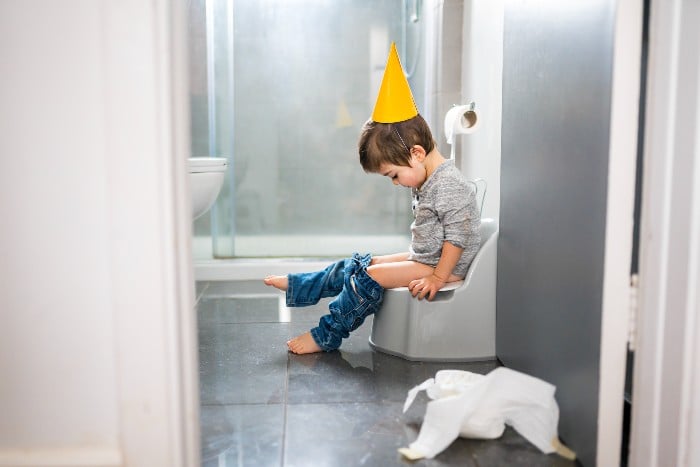[ad_1]
Preschool is looming in the not-so-distant future. Other parents are bragging about their toddler toilet training accomplishments. But is your toddler boy is ready to be potty trained? Let’s have a look at how to potty train a boy!

If your son is still in diapers, going out to the store means lugging around diapers, wipes, and extra pairs of pants. Additionally, there doesn’t seem to be any interest in the toilet whatsoever. This is probably a very familiar scenario for parents of toddler boys who are itching to get them potty trained. Although some gentle pushing may be necessary, it is very important that the child is ready physically and mentally before pursuing these potty training tips.
How to Potty Train a boy?
When your two-year-old son starts pulling down his diaper or standing at the toilet to copy his father’s behaviour, you know he’s getting ready for potty training. Each child will vary in his readiness for undertaking this important task, so you can’t just expect every boy to be mature enough by age two or three, for example. If you are unsure when to begin this training, ask your family doctor’s opinion.
By age two or two-and-a-half, you may want to start shopping for a potty pot. Most children’s furniture stores carry them, and you may be able to get one that is reasonably priced from a department store as well. Let your son go with you to pick out a favourite design or theme, as well as one that seats him comfortably.
There are several behaviours to look out for when determining if a toddler boy is ready to be potty trained. Try answering these questions to find out if the time to try the potty is imminent for a boy:
- Is he curious about using the bathroom?
- Is he interested in pleasing you?
- Is he displaying a desire for independence?
- Does he have an older brother that he constantly emulates?
- Does he like to pretend he is a grown-up?
- Does he respond positively to praise and encouragement?
If the answer to one or more is yes, then a strong motivators for toilet training have been identified.
Potty Training Plan
Once a child is ready, parents need to establish a clear potty training plan. Have training pants, a potty seat, and pull ups handy. Set a timetable with goals. When they are met, reward those goals with stickers, positive praise, special outings, TV time, or anything that he enjoys. Try incorporating these important steps:
At home, let your child adjust the seat to his liking in the bathroom. He may want to place it beside or across from the adult toilet. Avoid letting him keep it in his room as a play item, because he may not take this training as seriously as he should. Don’t let him store toys on it, either, as they could become soiled or this will support the notion of potty chair as plaything.
- Use a definitive tone of voice to announce when potty training will begin.
- Set out the potty in an accessible location (doesn’t need to be the bathroom).
- Note when the child usually has bowel movements and place him on the potty at these times.
- Keep his clothes on at first.
- Read a story to encourage him to stay on the potty.
- Have him practice walking to the potty.
- Decide how he will be rewarded for his efforts and be consistent.
- Decide how accidents will be handled.
Potty training tips for boys
These are some handy potty training tips for boys:
1. Have your son choose a colour or theme of toilet paper that he wants, and keep a roll beside his potty chair. This will instil a sense of greater control and ownership over this new training task.
2. Take your toddler to the bathroom for toileting several times a day. You can ask or accompany him to the potty seat every couple of hours or when you see him tug at his diaper or attempt to pull it down. He will not use the potty chair each time he sits on it, but he will become more familiar and comfortable with its use to facilitate greater ease each day.
3. Don’t insist that he cleans the potty bowl after usage. You can let him assist if he wants to, but this task belongs to the parent to ensure the pot is kept clean and hygienic. Some children may even fear handling their own elimination products, so take care of this task as your child learns how to manage bodily functions.
4. Don’t stop buying diapers until you are sure the process has been mastered, which may take several weeks or months. Your child may have accidents during play, in the car while traveling, or at the store when there is a long wait in line or no available restroom. Night-time accidents are common as well. Be patient and good-natured during this transitional phase.
Potty Training Resistance
Be sure not to punish or reprimand your child for potty mistakes. At first he is likely to use the potty infrequently. As he gets used to it, however, he may want to sit on the toilet with pants up or down to see how it feels. There are sure to be more misses than hits with the pot, and droplets on his clothing or the floor. Keep a washable rug under the potty chair for this purpose. Never discipline your child for an accident or a miss. Instead, praise him for small successes, like asking to use the potty seat or sitting on it for a few minutes, even if there are no results this time.
If there is a resistance to potty training, one or more of these tips may be helpful:
- Never use force or hold him down on the potty
- Change dirty diapers immediately
- Don’t pressure, judge, or punish for accidents
- Have him wear clothes and training pants that are easy to remove
- Keep diaper and pants off at various times during the day
- Use a sticker board, prize bucket, or ticket jar for rewards
- Read age-appropriate and entertaining potty training books together
- Start plan during warm season when clothes are lighter
- Have him observe/model other male members of the family
- Make older boys responsible for accidents
You can view potty training videos on Youtube. These often include catchy rhymes and sing-song lyrics that will make potty training seem natural and fun for your little one. There are also books you can get that teach your son more about the simplicity and desirability of mastering potty functions.
In conclusion
Since modern diapers are so much easier to handle and more comfortable to wear, potty training tends to be delayed a little longer. It isn’t uncommon for boys to reach the age of four or even five before they are fully potty trained. Keep in mind that all children develop at different rates and have patience. Remember that your child, like all others, will eventually make the successful transition from diapers to toilet.
Potty training is an important life skill that children must learn before going to school. Parents can do much to help or hinder their child’s success, so take a positive approach.
[ad_2]
Source link
